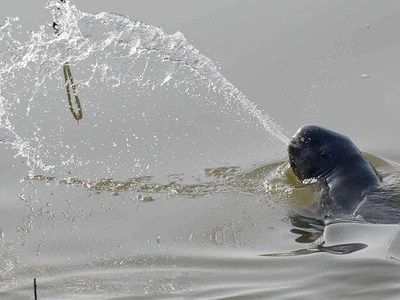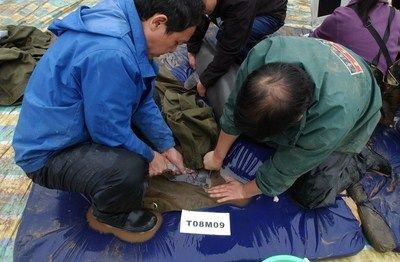
Newsroom
Conservationists from SeaWorld and the Chinese Academy of Science Publish Foundational Research to Help Save the Endangered Yangtze Finless Porpoise

The Yangtze finless porpoise (YFP) is listed as critically endangered due to its exposure to man-made threats, such chemical and noise pollution.
The YFP – cousin to the near-extinct vaquita off the Gulf of
Informed by years of blood samples collected from 188 porpoises between 2009 to 2017 and 2002 to 2015, respectively, the study establishes the first set of reference intervals for 49 veterinary laboratory tests, providing essential baseline data for future studies on the species.
SeaWorld was invited to participate in this research due to its long history of collaboration in reproductive science, husbandry practices and veterinary medicine. As a world-leading expert in cetacean conservation medicine, Vice President of Conservation Research, Dr.
"Researching endangered species like the YFP is an ever-increasing challenge," said Dr. Robeck. "The porpoise's inaccessibility and insufficient population size limits the amount of biological information we can collect and the development of effective population recovery efforts. But it is critical that we study the biology of all species prior to a point where the population is so severely depleted, they're unrecoverable."
"SeaWorld's collaboration has provided the valuable veterinary and scientific insights needed to effectively advance our efforts and—hopefully one day— treat ailing wild YFPs," said Dr. Hao. "After the loss of the Baiji, the YFP is the last remaining freshwater cetacean in
Amid heightened urgency for conservation following a UN report citing how human-driven activity may be driving more than a million species to extinction, SeaWorld published a similar study earlier this year on killer whales – another species where select populations are rapidly declining. Informed by decades of killer whale data collected from blood samples of whales at its
Conservation research is a key component of SeaWorld's larger commitment to conservation and animal welfare and was established as a priority by its founders before the parks opened five decades ago. This commitment includes sharing SeaWorld's technical, veterinary and scientific expertise, as well as providing unprecedented access to animals to researchers, and funding and supporting field research projects around the world, made possible by the high caliber of care and attention given to the animals in its parks, and the millions of guests who visit every year. The animal health professionals and scientists at SeaWorld have contributed to more than 1,000 studies that advance the global scientific community's understanding of marine animals.
About SeaWorld Parks & Entertainment, Inc.
SeaWorld Parks & Entertainment is a leading theme park and entertainment company providing experiences that matter and inspiring guests to protect animals and the wild wonders of our world. The company is one of the world's foremost zoological organizations and a global leader in animal welfare, behavioral training, husbandry and veterinary care. The company collectively cares for what it believes is one of the largest zoological collections in the world and has helped lead advances in the care of animals. The company also rescues and rehabilitates marine and terrestrial animals that are ill, injured, orphaned or abandoned, with the goal of returning them to the wild. The SeaWorld rescue team has helped more than 35,000 animals in need over the last 55 years.

SeaWorld and the Chinese Academy of Science’s study was informed by years of blood samples collected from more than 180 Yangtze finless porpoises between 2009 to 2017 and 2002 to 2015, respectively.